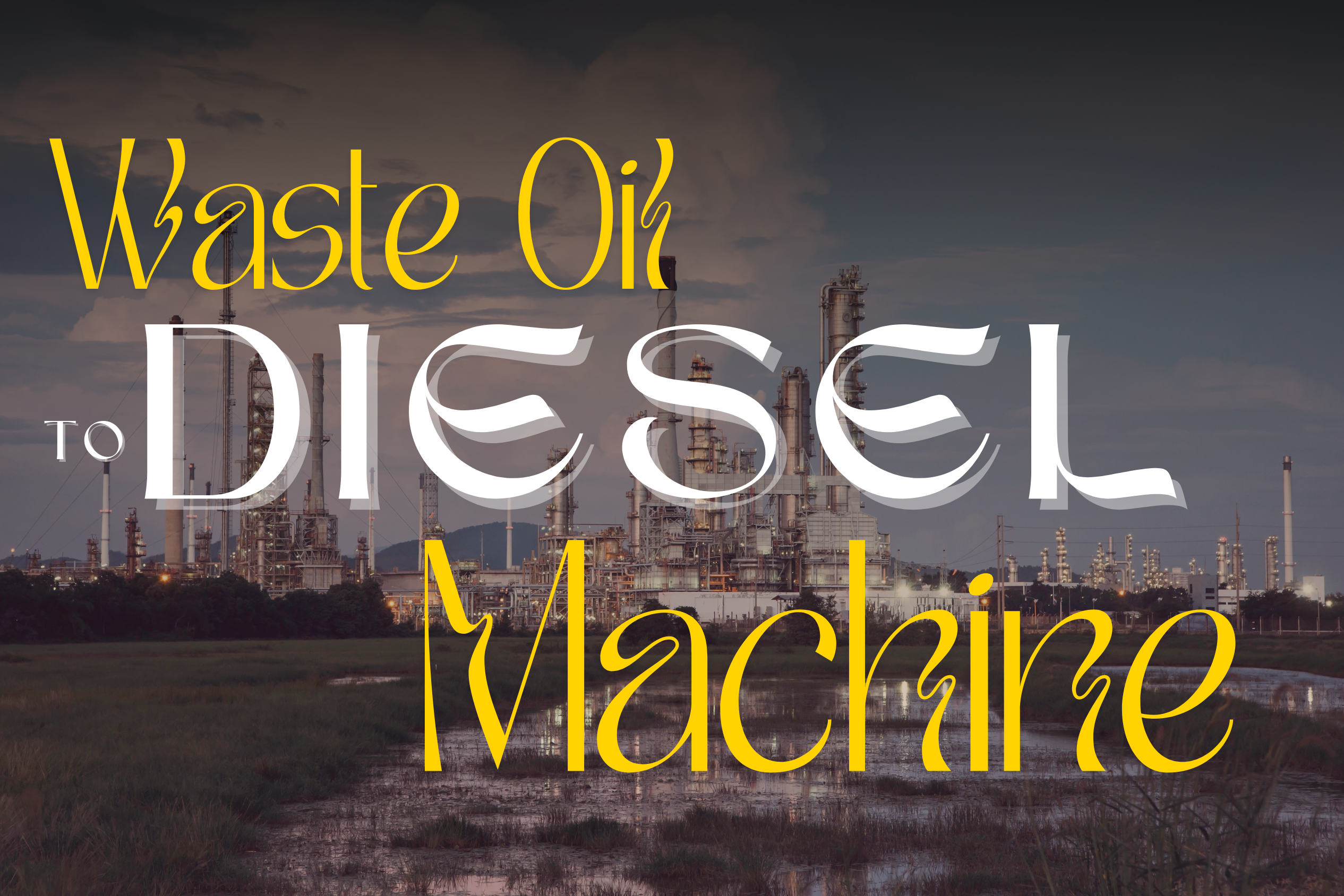A Sustainable Solution for Energy Needs
Waste oil can be viewed as an undesirable by-product of industrial, automotive, or even cooking processes. However, breakthroughs in waste oil conversion into diesel have changed the perception. Advanced processing and equipment have transformed waste oil into a source of diesel fuel, which is relatively inexpensive and environmentally friendly to meet fuel requirements. In this blog, we will discuss the steps involved in converting waste oil to diesel, the benefits it entails for different industries, the underlying technology, and how the Veera Group is fronting the conversion of waste oil into useful diesel.
1. What is Conversion of Waste Oil to Diesel?

The waste oil to diesel conversion process will be the making of used or discarded oil refined into usable diesel fuel. This will involve, through this method, a recycling process of the industry’s waste oil; used motor oil, hydraulic fluids, and even cooking oil, to be made as valuable fuel instead of it being dumped. This would be sustainable and economical as reliance on newly extracted oil will reduce while minimizing waste and pollution.
Typically, waste oil contains impurities, heavy metals, and other toxic materials that are not good enough for reuse directly. In the conversion of waste oil to diesel, all the impurities, heavy metals, and toxic materials are filtered out and leave the product with the purest quality of diesel, which can be used for the engine, generator, and machines. It is not just recycling but an innovative way for the utilization of energy as well as addressing environmental issues.
2. Why Waste Oil to Diesel Conversion is Important
Some value may be seen in terms of its economic, environmental, and resource-conservation implications. The new life for used oil is given through this type of conversion besides supporting companies in their search for greener energy alternatives. Among the reasons for considering value in waste oil to diesel conversion are:
Economic Gains
This reduces the newly demanded quantity of diesel since it will be manufactured from waste oil. This saves companies and industries on energy costs. It can be helpful to those businesses which operate on diesel-powered machinery, such as trucking or manufacturing, when they are able to save through the reuse of their old oil to become diesel. Also, this entire process generates a new source of income because companies have the option of either selling or reusing the produced diesel through the conversion of waste oil to diesel conversion fuel.
Environmental Benefits
The harmful disposal of waste oil contaminates soil and water, affecting ecosystems and posing a danger to public health. The industries use waste oil to diesel conversion to reduce pollution and conserve resources. This process of conversion reduces the emission of greenhouse gases that are associated with the production of traditional fuels since recycled diesel is cleaner and more environmental-friendly.
Resource Conservation
The waste oil to diesel conversion is the epitome of resource conservation. We are not just extracting crude oil but recycling available resources, therefore reducing the demand for raw materials. We are converting waste oil into diesel that will help us build an energy future that is greener and more sustainable.
3.The conversion process of waste oil to diesel is a multi-stage process, but all these stages are crucial for producing the best quality diesel. Here is an overview of how it works:
Step 1: Pre-Treatment of Waste Oil
Pre-treatment or cleaning and preparation is necessary before the waste oil is ready to go through distillation and conversion. This is because there’s a need to remove water, solid impurities, and unwanted contaminants in the oil. Pre-treatment usually involves filtration and dewatering methods that will ensure the oil is free and clean enough to be fed into the machine for the waste oil to diesel conversion process.
Step 2 : Distillation and Conversion
Once pre-treated, the waste oil is distilled. In a waste oil to diesel, the waste oil gets heated in a controlled environment and separates into different fractions based on their boiling points. At that stage, the fuel is separated into lighter and heavier components, with diesel fuel emerging as the main end product. The outcome of the diesel conversion from the original oil is most comparable to conventional diesel fuel and is acceptable for most engines and all industrial applications.
Step 3: Purification and Final Processing
After distillation, the diesel fuel obtained is purified to meet the quality requirement. This stage may also include further filtration or catalytic treatment to remove any remaining impurities. Once purified, the diesel fuel obtained is ready for use, giving industries an efficient, cost-effective alternative to conventional diesel.
4. Technology Behind Waste Oil to Diesel Machines

Technology waste oil to diesel conversion is quite technical. Waste oil to diesel machines are built to have considerable volumes of oil that must be converted into diesel. Machine types differ in size and sophistication, from small units adapted for localized projects to more industrialized systems capable of processing thousands of liters daily.
Key features of such machines include:
Heating Chambers: These are components that heat the waste oil to a desired temperature, thus fractionating it into different fuel fractions.
Distillation Columns: The columns help separate the lighter and heavier fractions of oil, and only the diesel fraction that is required will be collected.
Filtration and Purification Units: The filtration system will remove residual contaminants from the distillation process, and the purification units enhance the quality of the diesel for industrial purposes.
The latest developed waste oil to diesel machines also have the system on emission control, hence become more environmentally friendly. From the above discussion, you can see that such machines perform a significant role in the entire process of converting waste oil to diesel conversion in terms of efficiency and sustainability.
5.Applications of Diesel Produced from Waste Oil
Waste oil to diesel conversion yields of high-quality diesel fuel useful in various sectors: Industrial Equipment
Waste oil is used to produce the diesel, which is then implemented into heavy industrial machinery. To the construction, mining, and agriculture industries, a recycled diesel offers a renewed source of fuel that lowers reliance on fossil fuels.
Automotive Fuel
Many transportation and logistics companies can use waste oil to be converted into diesel fuel for their fleets. In this application, they can save on fuel costs while supporting environmental initiatives since the recycled diesel contains fewer pollutants than regular diesel.
Power Generation
It is excellent in power generation in areas without easy access to traditional fuel supplies. It is very useful for backup generators in hospitals and schools, among other such remote areas, where energy can be provided reliably and in a sustainable manner.
6. Advantages of using a Waste Oil to Diesel Machine
Using a waste oil to diesel machine serves the interest of businesses with a desire to save money and at the same time reduce its environmental footprint:
Cost Savings: The conversion of waste oil into usable diesel fuel will reduce the cost of fuel to companies and may generate more income if the recovered diesel is sold.
Environmental Responsibility: Waste oil to diesel machines reduce waste oil disposal, which in turn means reduced pollution and conserving natural resources.
Energy Efficiency: The use of these machines ensures that companies are able to supply their fuel requirements without crude oil, thereby contributing to a larger extent to the efforts of energy conservation.
7. Problems in Waste Oil to Diesel Conversion
Although the waste oil to diesel conversion is a very useful process, it also has some associated problems:
Regulatory Compliance
In many countries, conversion processes of waste oil are strictly regulated, including control of emissions and waste management. Companies engaged in waste oil to diesel conversion must meet environmental guidelines, which may sometimes require extra investment on emission control and waste management.
Technical Challenges
The quality of waste oil can be significantly different, influencing the conversion process efficiency and effectiveness. Proper management and maintenance of large-scale waste oil to diesel machines are critical for consistent results of waste oil to diesel conversion.
Capital Cost
It requires a huge set-up capital, and a waste oil to diesel machine involves an initial investment, which would be pretty substantial for several businesses. However, long-run savings and environmental benefits largely outweigh such costs, turning it into a good value for money for most industrial concerns.
8. Waste Oil to Diesel Future Directions

With the rapid advancement of technology, waste oil to diesel conversion is a promising future-very efficient and environmentally friendly. Some of the trends and future prospects for the sustainable solution include:
Efficiency and Lower Emissions
Research is still done to produce newer waste oil to diesel machines that come with further features enhancing the distillation process and also reducing some emissions. In this sense, companies will not hesitate or be resistant to accepting it as a normal practice or procedure in their business organizations.
Broader Industry Compliance
Increasing requirements of sustainable energy solutions; one can expect that with further requirement for such sustainable energy solution more industries are going to absorb the waste oil-to-diesel conversion and support the same for their fueling.
Manufacturing industries as well as transportation industries as well as local municipalities also start showing interest in waste oil-to-diesel converting processes.
Governments of all countries are embracing sustainable activities, and most are giving incentives to businesses that participate in the waste oil to diesel conversion process. This is motivating companies to invest in recycling technologies and also leaves the environment cleaner and greener.
Conclusion:
The process of converting waste oil into diesel provides a sustainable way of dealing with both waste management and fuel needs while yielding benefits on all economic, environmental, and resource conservation fronts. Companies such as Veera Group are innovators in this space and are at the forefront of producing usable diesel from waste oil, which is an important support to industries and contributes to resource conservation for the future. With Veera Group, waste oil can go beyond the conventional measures of disposal and proves that innovative approaches can lead to a positive environmental outcome and fuel sustainability and this blog about the waste oil to diesel conversion.
